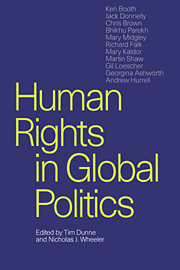Introduction: human rights and the fifty years' crisis
Published online by Cambridge University Press: 05 June 2012
Summary
The humanitarian principles embodied in the UN Charter and the Universal Declaration of Human Rights marked the beginnings of a full-blown global human rights regime. The Declaration, signed fifty years ago, established a standard of civilised conduct which applies to all governments in the treatment of their citizens. For example, the Declaration requires states to provide subsistence needs and basic welfare provision as well as a panoply of civil and political rights. Although the latter assumed prominence in the subsequent history of the post- 1945 regime, it is important to underscore that from the outset, universal human rights encompassed a concern for positive rights (such as collective provision of education and healthcare) as well as negative rights (freedom from repressive government policies).
The framers of these basic documents assumed that there was no necessary conflict between the principles of sovereignty and nonintervention and respect for universal human rights. This represented a historic evolution in the norms of international society which from the seventeenth century onwards had maintained that the domestic practices of governments were not a subject of international concern. According to the Westphalian conception of legitimacy, a government's claim to be recognised as sovereign was not dependent upon how it behaved towards its own citizens. As a consequence of the experiences of totalitarianism, governments recognised that there was a need to challenge the Westphalian model of unlimited sovereignty. In these emerging human rights norms, there was a clear consensus that states must be made accountable for their behaviour.
- Type
- Chapter
- Information
- Human Rights in Global Politics , pp. 1 - 28Publisher: Cambridge University PressPrint publication year: 1999
- 8
- Cited by

